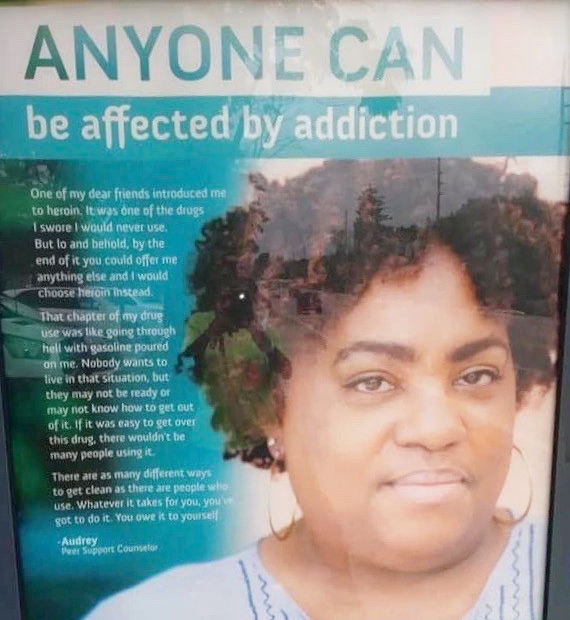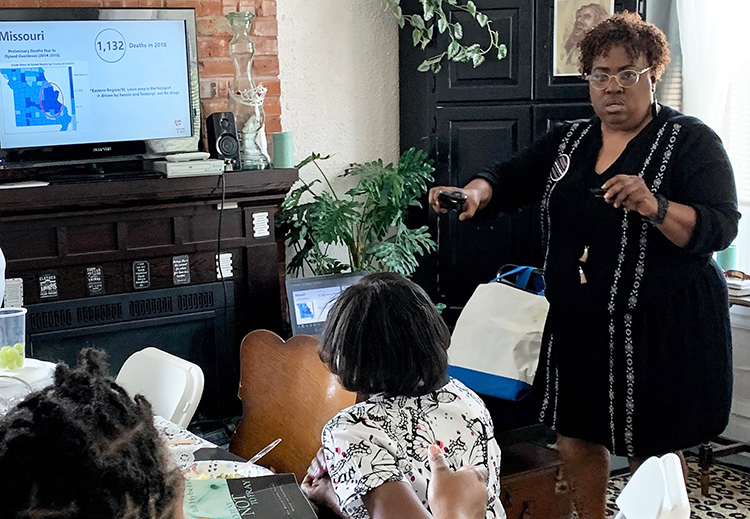Audrey uses her past struggles to shape the authentic person she is today—a mother of three, a certified peer recovery support specialist, a domestic violence crisis hotline operator, and a powerful advocate for opioid overdose prevention.
Her story
Drug addiction changed the canvas of Audrey’s life while in college in the late 1980s. Smoking marijuana was socially acceptable, she says. Unaware a friend had added crack cocaine to a blunt, she smoked it. “It was an immediate love affair, no holds barred,” she said. “My lifescape changed in a matter of weeks to extremes that still blow my mind today.”
Her mother soon became concerned and called her. “My mother said, ‘If I don’t see you soon, I’m afraid I won’t see you anymore,’” she says. “That resonated with me.” Her neighbor gave her $87 and drove her to the bus station.
Audrey’s friends and family helped her at the time, she says, “But as soon as they turned their heads, I went back out.” That continued on and off until 1993, when the courts offered her treatment or jail time.
She chose treatment and stayed sober until 2003, when she went back out to use again. She stopped five years later, after finding out she was pregnant with her third child. She has been clean since.
Peer Recovery Support
In 2009, while a client of Queen of Peace Center, Audrey accepted a professional offer to help provide Screening, Brief Intervention, and Referral to Treatment (SBIRT) services through a partnership between the Center and Family Care Health Center. Family Care later hired her for a full-time position as a Peer Recovery Support Specialist in the Behavioral Health Department where she helps individuals struggling with alcohol and substance use disorders.
Audrey is certified as a peer specialist through the Missouri Credentialing Board; she appreciates the Board’s recognition that one person’s struggles can be meaningful to another person. She says, “Nine times out of 10, people say, ‘You don’t understand what’s going on.’ You can’t read my experiences from your [text] book.’”
She tells clients that she understands more than they know. “Their shoulders visibly drop. It starts a relationship that I don’t think is paralleled by anything they’ve incurred.”
Audrey recently petitioned for a work cell phone. “Even though the clinic closes at 5 p.m., drugs unfortunately don’t.”
Safe House
Audrey also works as a crisis intervention hotline operator for The Women’s Safe House, a safety net she has used herself. During the COVID-19 pandemic, domestic violence has had a global uptick. Woman and their minor children are housed in a hotel for no less than two weeks before being brought into the shelter. They are tested for coronavirus infection, receive food and hygiene care packages, and receive daily case management services.
If a client leaves the hotel at any point during those two weeks, they must restart the process. “That’s kind of hard to do when you’re a mother and you may have three or four kids, or even a single woman,” she says, “You might want some take out.”
Clients who make it to the safe house stay in their own suite, made up of a larger room for four and a smaller room with two beds. During the pandemic, only one family may stay in each suite and meals are staggered to reduce the number of people in a communal area.
The safe house now includes a fully functional children’s school program, including socially distanced desks and computers, taught by students majoring in education. Male children below 18 years of age must be in school or working to stay in the shelter. “A lot of shelters only take males up to 13 years, which I think is a travesty,” she says.
Narcan Lady
Audrey spends a few hours on the weekends working for the State Opioid Response project at the Missouri Institute for Mental Health. She is part of their faith-based initiative to educate about opioid overdose and provide kits of Narcan, the brand name of Naloxone, an emergency nasal spray to counter the effect of opioid overdose.
Prior to the pandemic, the program would send her to the riskiest neighborhoods–including her own—to provide education at schools, churches, and agencies. Since the doors have been closed in many communities, she says, “I keep a supply of Narcan kits on me at all times.”
When she sees someone whom she suspects is an opioid user, she strikes up a conversation. If they reject the kit, she tells them, “Take it anyway. It’s a cool bag to have, and you know somebody who knows somebody who’s doing something.” She gives out over 120 kits per month and is known on the street as the Narcan Lady.
Exposure

Audrey is often asked to share her story. Last year, a doctor whom Audrey admires at Family Care asked her to speak to a group at the St. Louis County Department of Public Health. She hesitated when a County representative enthusiastically asked to take some pictures.
She relented, approved the proofs, and soon began to receive photos of her friends in front of her billboard or at the Metrolink station. “I shot myself in the foot with that,” she laughs.
